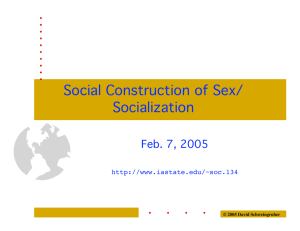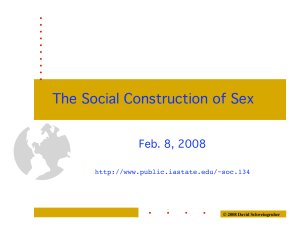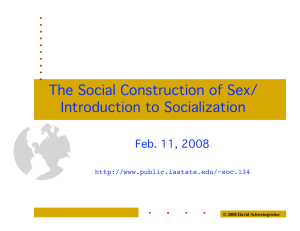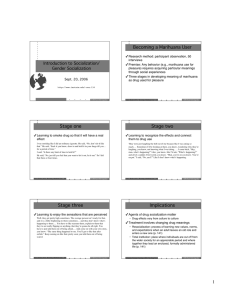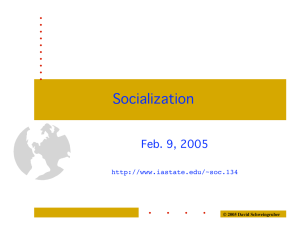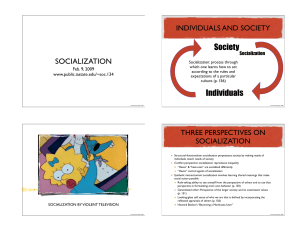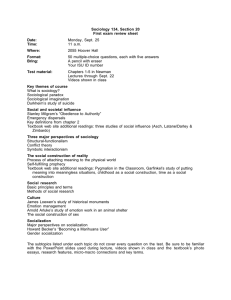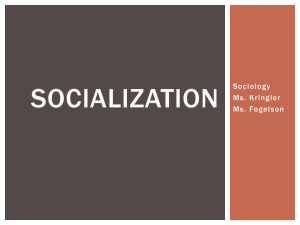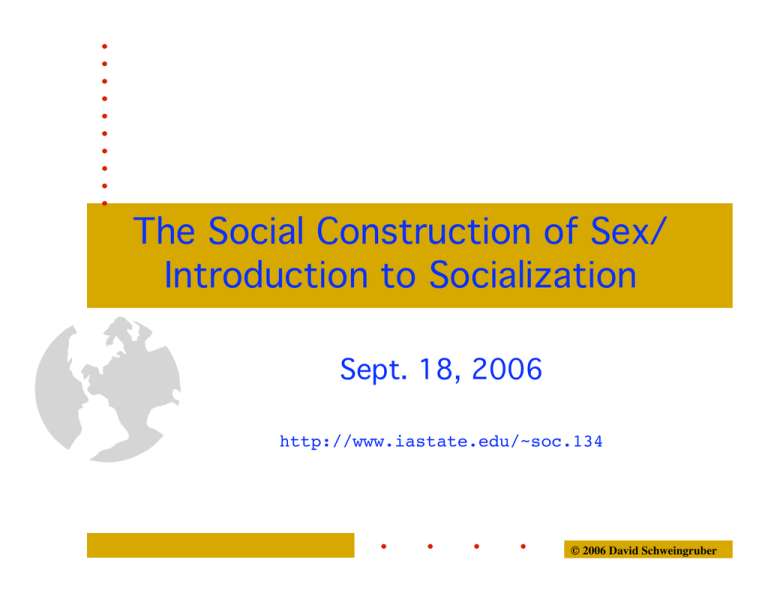
The Social Construction of Sex/
Introduction to Socialization
Sept. 18, 2006
http://www.iastate.edu/~soc.134
© 2006 David Schweingruber
Sex vs. gender
Sex: biological maleness or femaleness
Gender: psychological, social, and cultural aspects of maleness and
femaleness
The two sexes are assumed to be
• Universal (found in all cultures throughout history)
• Exhaustive (there’s no third sex)
• Mutually exclusive (a person can’t be both)
Recently, sociologists have been questioning the taken-for-grantedness
of the categories “man” and “woman”
• Do the two sexes belong to the physical world or the world of meaning?
Two important pieces of evidence:
• Cross-cultural variation
• Existence of intersexuals (and our reaction to them)
©©2006
2000David
DavidSchweingruber
Schweingruber
Social construction of sex
Our belief in two sexes is not universal (pp. 117, 128-9)
A brief history of the sexes in Western culture
Pre-18th Century: One sex (females are inferior version)
18th Century: two sexes
1960s: Surgical assigning sex becomes norm (“culture demands it”)
1990s: Hermaphrodite liberation movement (ISNA)
Intersexuals illustrate constructedness of two-sex model
Cheryl Case illustrates how sex (not just gender) is a social construct
But case of “As Nature Made Him” points to some role for biology
©©2006
2000David
DavidSchweingruber
Schweingruber
People as consequence of society
Process through
which one learns how
to act according to the
rules and expectations
of a particular culture
(p. 135)
©©2006
2000David
DavidSchweingruber
Schweingruber
Three perspectives on socialization
Structural-functionalism: socialization perpetuates society by making
needs of individuals match needs of society
Conflict perspective: socialization reproduces inequality
• “Haves” & “have-nots” are socialized differently
• “Haves” control agents of socialization
Symbolic interactionism: socialization involves learning shared
meanings that make social action possible
• Role-taking: ability to see oneself from the perspective of others and to use
that perspective in formulating one’s own behavior (p. 139)
• Looking-glass self: sense of who we are that is defined by incorporating the
reflected appraisals of others (p. 138)
• Howard Becker’s “Becoming a Marihuana User”
Definitions: Newman’s Sociology (2000). Pine Forge Press.
©©2006
2000David
DavidSchweingruber
Schweingruber
Becoming a Marihuana User
Research method: participant observation, 50
interviews
Premise: Any behavior (e.g., marihuana use for
pleasure) requires acquiring particular meanings
through social experiences
Three stages in developing meaning of marihuana
as drug used for pleasure
Source: Becker (1953). “Becoming a Marihuana User.” AJS.
©©2006
2000David
DavidSchweingruber
Schweingruber

